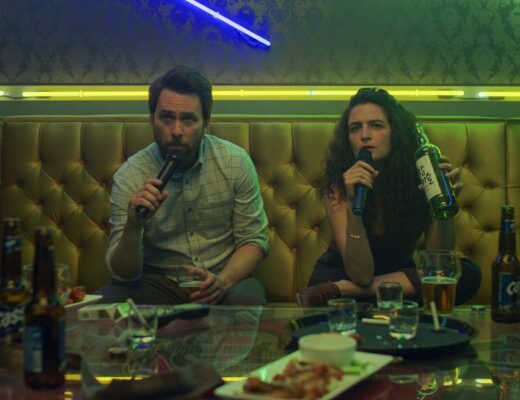Licorice Pizza continues Anderson’s interest in how personal histories are assimilated into myth, and largely does so compellingly, but ultimately still feels more lopsided than the director’s best works.
Whatever his ambitions as chronicler of American history, Paul Thomas Anderson’s directorial style lends itself to portraying actions and events that are not specific, but typical — not realistic, but archetypal. This is by no means a failing. The flowing, crystalline surfaces of his images, his penchant for molasses-slow dissolves and transitions, the hermetic atmosphere of his films: these are not terribly suited to excavating the details of a historical period or place, but they afford something of arguably greater artistic importance, a view of how histories are assimilated into myth. This is arguably clearest in The Master (2012), where Anderson starts with the disjunction between a seed (Joaquin Phoenix’s Freddie Quell) and a hostile, alien environment (post-war America, the Cause), and looks at how this results in an entirely new formation, where questions of formal cause or relative dominance cease to matter. Hence why the film resembles a duel in which each party tries to assimilate the other into their established world, but instead of shattering their respective myths, they end up creating an entirely new one, a more perfect crystal. After the pick-a-point scene, in which Quell races away from Lancaster Dodd (Philip Seymour Hoffman) toward the movie’s literal vanishing point, virtual and actual, fantasy and reality, become indistinguishable. The Quell–Dodd relationship reaches a state of perfect equilibrium.
Despite its markedly different milieu, Licorice Pizza, set in Anderson’s native San Fernando Valley in the ’70s, does not overturn this dynamic. Over the course of the film, we watch as 15-year-old Gary Valentine (Cooper Hoffman) and twenty-something Alana Kane (Alana Haim) test the myths that the other has built up around themselves. Gary’s case is obvious: A child actor and budding entrepreneur with some sort of moderately risky business always on the go, he constantly bloviates and self-mythologizes, and for a time, Alana is intrigued enough by his bravado to go along with his schemes. For her part, Alana lives with her parents and two older sisters and drifts rather aimlessly, but she nonetheless maintains a kind of mystery that’s difficult to crack. For the most part, then, Licorice Pizza watches how their two personalities interact, also observing how the rest of the world — or at least the world of Anderson’s imagining — gets swallowed into their story.
The gambit of casting newcomers Haim and Hoffman in the lead roles pays off insofar as the film’s more recognizable names and events — Sean Penn as a William Holden stand-in, the 1973 OPEC crisis, and Bradley Cooper as movie producer Jon Peters — simply become material for their shared myth. Anderson gives his various set pieces an unignorable charge, and watching Penn ride a motorcycle over a flaming pit or Gary running through the chaos of a gas station to the sound of David Bowie’s “Life on Mars,” one imagines how Gary or Alana might relate those events some fifty years or so later. The encounter with Cooper’s asshole movie producer leads to the film’s tensest set piece, in which Alana navigates a truck downhill, in reverse, amid the undulating landscape of Hollywood Hills. Immediately after, the near-death experience becomes for Gary just another story, just another cause for celebration. He wasn’t the one piloting the truck, but his sense of accomplishment is unmistakable.
For Alana, however, the experience incites a kind of epiphany. At the very least, it drives her away from Gary and his 15-year-old friends, and toward a Valley politician named Joel Wachs (Benny Safdie), whose mayoral campaign she decides to work for. As in films from Citizen Kane (1941) to, well, Mank (2020), politics is pitted against entertainment. And as in those films, the cynical, mercenary aspects of each become increasingly difficult to differentiate. The details of how Alana becomes disillusioned with Wachs’ world are not terribly important; suffice it to say that she eventually returns to Gary, who has just opened another one of his latest ventures, a pinball machine palace. The climax sees Gary and Alana running to each other on a brightly lit street, and flashes back to… other moments in the film when they run to each other on brightly lit streets. The structuring myth of their relationship is evidently complete.
For all of the visual emphasis on symmetry, however, Licorice Pizza ultimately feels lopsided in a way that Phantom Thread (2017), for instance, does not. It’s not that Alana isn’t a compelling character; she is. But while the downhill-in-reverse sequence — as up-front a metaphor as they come — signals an irreversible rupture in Alana’s life up to that point, her eventual return to Gary does not signal any appreciable change in their relationship. Gary just keeps on moving as before, all but affirming his boys-will-be-boys innocence, with Penn and Cooper’s lecherous adults as the obviously unappealing contrast. (Despite throwaway details like Alana’s co-worker telling of how Gary would solicit handjobs from her, Anderson goes out of its way to convince us that he is, after all, a good kid: When Alana is passed out next to Gary on a waterbed and he gingerly moves to cop a feel, a cut assures us that no contact was made.) By the end, it becomes somewhat clearer just whose fantasy this is, confirming Gary’s claim that the world does in fact revolve around him. And what you’re left with is, well, a less risky Risky Business.







